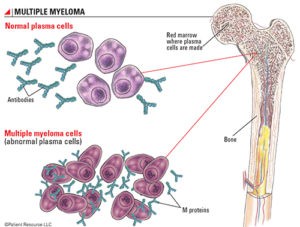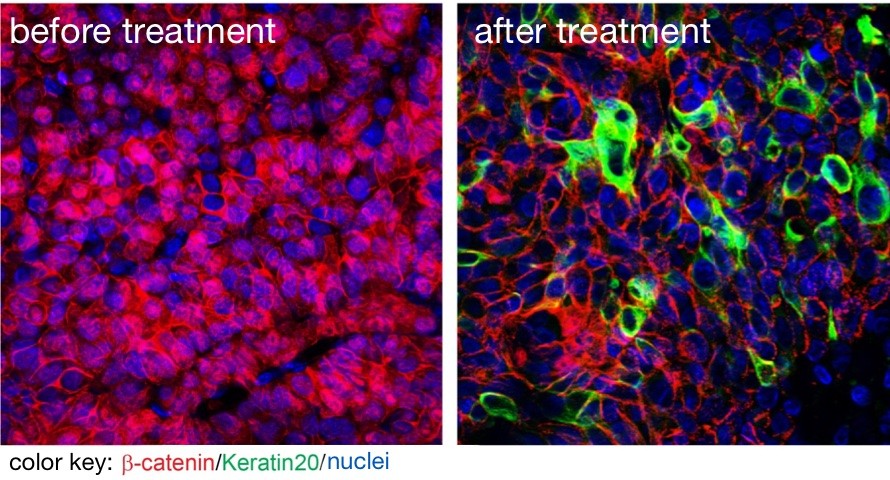Osteolytic bone disease and renal dysfunction are complications of multiple myeloma. Zoledronic Acid, used for the prevention and treatment of bone complications, can be nephrotoxic…”
According to research, more than 80% of multiple myeloma (mm) patients will sustain bone damage at some point during their lives. Bone health, therefore, must be central to every MMers lifestyle. If you are diagnosed with multiple myeloma, stages 1,2 or 3 your oncologist will probably suggest that you undergo induction therapy. Bone-strengthening (bisphosphonate) therapy will probably also be included in that recommendation.
If you have kidney damage in any way, please consider undergoing Denosumab for that bone therapy rather than a bisphosphonate drug.
Fortunately, there are a variety of evidence-based therapies shown to enhance bone health.

The traditional bone health therapy, conventionally speaking, has been a class of drugs called bisphosphonate therapy such as Zometa and Aredia. I underwent monthly infusions of Aredia when I was first diagnosed.
The study linked and excerpted below points to one of the challenges of bisphosphonate therapy- kidney damage. Because almost 50% of MMers experience kidney damage or renal insufficiency, it is important to consider the consequences of any therapy on any and all organs.
The study below explains that Denosumab is not “cleared” through the kidneys whereas bisphosphonates are. In short, according to the study discussed below, both therapies are equally good at enhancing bone health. Yet Denosumab is not cleared through the kidneys whereas bisphosphonates are.
As you can see from the other studies linked and excerpted below, there are a variety of therapies for the kidney-impaired MMer to consider.
Have you been diagnosed with MM? Do you know your creatinine levels?
I am both a long-term MM survivor and MM cancer coach. I work with MM patients, survivors and caregivers to learn about those therapies, conventional (FDA) and evidence-based non-conventional, that best fit the needs of the patient.
David Emerson
- MM Survivor
- MM Cancer Coach
- Director PeopleBeatingCancer
Recommended Reading:
“Background: Osteolytic bone disease and renal dysfunction are complications of multiple myeloma. ZA, used for the prevention and treatment of bone complications, can be nephrotoxic. DMB inhibits RANKL and thereby osteoclast function, and is not renally cleared. This international, phase III, randomized, double-blind study evaluates the efficacy and safety of DMB compared with ZA in newly diagnosed myeloma patients (pts).”
Watch the video linked here to learn about denosumab versus zoledronic acid for the MM patient with renal damage.
“The U.S. Food and Drug Administration (FDA) and Novartis Pharmaceuticals have advised healthcare professionals via letter of required dose reductions for zoledronic acid injection (Zometa) when treating advanced cancer in patients with mild to moderate renal impairment, according to an alert sent today from MedWatch, the FDA’s safety information and adverse event reporting program…
Due to the risk of clinically significant deterioration in renal function that may progress to renal failure, single doses of zoledronic acid for the treatment of multiple myeloma and metastatic bone lesions from solid tumors should not exceed 4 mg, and the duration of infusion should be no less than 15 minutes, in patients with creatinine clearance greater than 60 mL per minute…”
“The results of a recent Phase 2 trial indicate that Velcade-doxorubicin-dexamethasone treatment can reverse multiple myeloma-associated kidney damage in myeloma patients suffering from kidney failure. The regimen also improved patients’ disease statuses and was associated with few severe side effects…
Kidney damage is a common and potentially serious complication in multiple myeloma. Reversal of this damage can only be achieved by preventing the accumulation of protein-antibody complexes in the kidney.
Previous studies have suggested that Velcade (bortezomib) and Velcade-based regimens are particularly effective in reversing kidney damage in multiple myeloma patients.
Additionally, the active compounds in Velcade are broken down in the body through processes that do not involve the kidneys. As a result, Velcade does not interfere with kidney function and usually does not cause kidney-related side effects…
Sixty-eight multiple myeloma patients with antibody-associated kidney damage were treated with VDD. During the study, patients received a median of eight treatment cycles.
A total of 66 percent of patients achieved a partial response or better, and 38 percent of patients achieved a complete response.
Sixty-two percent of patients showed improved kidney function with VDD treatment. Kidney function was restored in 31 percent of patients.
Nine patients enrolled in the study were receiving dialysis due to severe impairment of kidney function. Three of these nine patients became dialysis-independent following treatment.
Researchers noted that kidney improvement correlated with response to treatment. Patients who achieved a complete or very good partial response showed the greatest improvement in kidney function…”
“Resveratrol (3,5,4′-trihydroxystilbene), a natural polyphenolic compound found in grapes and red wine, is reported to have beneficial effects on cardiovascular diseases, including renal diseases…
In addition to scavenging ROS, resveratrol may have numerous protective effects against age-related disorders, including renal diseases, through the activation of SIRT1. SIRT1, an NAD+-dependent deacetylase, was identified as one of the molecules through which calorie restriction extends the lifespan or delays age-related diseases, and this protein may regulate multiple cellular functions, including apoptosis, mitochondrial biogenesis, inflammation, glucose/lipid metabolism, autophagy, and adaptations to cellular stress, through the deacetylation of target proteins. Previous reports have shown that resveratrol can ameliorate several types of renal injury, such as diabetic nephropathy, drug-induced injury, aldosterone-induced injury, ischemia-reperfusion injury, sepsis-related injury, and unilateral ureteral obstruction, in animal models through its antioxidant effect or SIRT1 activation. Therefore, resveratrol may be a useful supplemental treatment for preventing renal injury…




